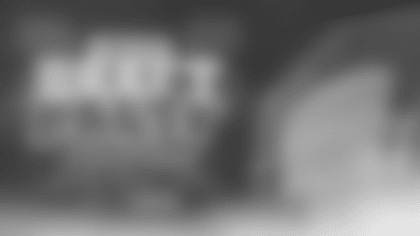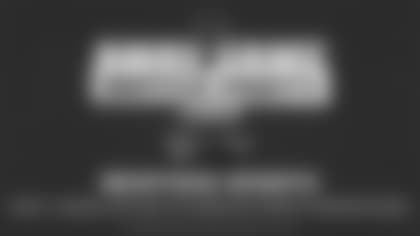Week 6: Ravens at Colts
Bill Polian, in his 11th season as Colts president, has a resume unique in the NFL. One of two men to win NFL Executive of the Year five times, Polian in the 1980s built the Buffalo Bills into a four-time Super Bowl participant. In the mid-1990s, he built the expansion Carolina Panthers into a team that made the NFC Championship Game in its second season, 1996. Since joining Indianapolis in 1998, he built the Colts from a 3-13 team in 1997 and 1998 into one that has made the playoffs eight of the last nine seasons, including an AFC Championship Game appearance after the 2003 and 2006 seasons, AFC South titles in 2003, 2004, 2005, 2006 and 2007 and a Super Bowl championship following the 2006 season. Each week during the season, in The Polian Corner, Polian and Colts.com will discuss issues pertinent to the Colts and the rest of the NFL.
Question: A 31-27 victory over the Houston Texans on Sunday. The Colts rallied from a 17-point deficit with just over four minutes remaining in one of the wildest, most-memorable finishes you'll ever see . . .
Answer: Our guys did a great job in terms of hanging in there and playing 60 minutes. We had a great opportunity to make some plays at the end and we did. We took advantage of their miscues and teams that have a history of winning can find ways to win in situations like that. We did, so we're not going to give it back and we'll just keep trying to get better every week.
Q: Were you surprised with how well Texans reserve quarterback Sage Rosenfels played considering the circumstances . . .
A: I don't know if I'd say, 'Surprised.' He has been a very good quarterback for quite some time. He did a very good job of managing that offense and putting them in a position to make plays and execute. The long drive in the third quarter really was from their perspective a thing of beauty. So, it's not surprising that he played well. The (fourth-quarter) fumble was just an unfortunate situation that happens in football. He was out there trying to make a play. He went airborne, the ball came out and we were able to return it for a touchdown, which was probably the only way we could have won – to get a defensive or a special-teams score – at that point in the game. Then, of course, once it got close, then we were able to execute and do some things. The bottom line is you play 60 minutes in the NFL because that's what the rules say. You can do a lot of things in 60 minutes. We live in a world today where at the end of the first quarter everybody's picking who's going to go to the Super Bowl, and this game if nothing else proves how fallacious that kind of thinking is.
Q: When you looked at the tape on Monday did you see anything different than what you saw Sunday?
A: You always do, because the tape contains all of the hidden things that you can't comprehend with the naked eye. From a positive standpoint, I think our young offensive line just got better and better as the game went along against a very good front four. They (the Texans) have a really good front four. Our guys settled in, got better as the game went along and that group will only continue to get better as they have more cohesion and more chance to work together and more chance of working together and seeing different fronts and different kinds of players. After all, it was only (rookie guard) Mike Pollak's fourth game and first regular-season game, so that was a real plus. We felt good about how the offensive line played. (Rookie) Jamey Richard and Mike Pollak especially played well at guard. (Left tackle) Charlie (Johnson) did his usual 'Charlie Job.' You don't know he's there except his opponent doesn't do much, either. We like that. He's quiet and very professional. He goes about his job in a very professional manner. It's really something when you can play all three positions on the offensive line and Charlie can. That was a real plus. The tight ends played really, really well. (Rookie) Tom Santi came up with some big catches, but the unsung hero there was (second-year veteran) Gijon Robinson, who through four games has really blocked really well and is getting more comfortable in the passing game. The only thing you could really fault there is something he'll continue to work on and get better – his run after the catch. That's just a matter of recognizing that he's not as nifty as Dallas (Clark) and he'll make more yards if he sticks his pads down and just goes north and south. But that's hard to do when you're watching Dallas every day. In terms of everything else, he was outstanding. (Running back) Joseph (Addai) made some great runs and the running game will get better as the season goes on. The more the offensive line works together, the more they're used to seeing different fronts and different kinds of players, the better they'll get and the better the running game will get. But it was good Sunday. The pass protection was good. One of the sacks we just got into a wrong situation. You really don't want a (running) back on (Texans defensive end) Mario Williams. Not that Joseph didn't try to block him. He did, but Mario's arms are so long that he can just go over a back and cause havoc. He's an outstanding player and that defense has been really, really well-coached. They know what they're doing and they get in the right place at the right time. They use their people very well, so the one sack was really nobody's fault. We should have been in a different protection. Other than that, how much better can you throw it than (quarterback) Peyton (Manning) threw it and how much better can you catch it than (wide receiver) Reggie (Wayne) caught it?
Q: On Reggie's game-winning touchdown, when he caught it one-handed, did he have a foot on the ground at that point?
A: Yes. It's 'catch – one-handed – then foot as quickly as you can wink an eye, then the second foot.' In my opinion they made the right call in upholding the call on the field. It was close enough that I thought about this (Sunday) night and got cold chills: suppose they had ruled it incomplete? I'm not sure there would have been entirely overwhelming evidence to change it, but they ruled it complete. They got it right on the field, then the replay confirmed it. I'm not a great fan of replay, but in this case, the referee made the right decision. I'm glad the referee on the field's making the decision, too. At least he's in touch with the people on the field who are making the call. In that case, it worked out for us. But as I say, you can't throw it any better than Peyton threw it and you can't catch it any better than Reggie caught it.
Q: The fourth-down touchdown reception by (rookie tight end Tom) Santi obviously was a big play. If he doesn't make that catch, the rest of the game probably doesn't play out as it did . . .
A: That's exactly right. He got in the right position and made the catch. He's the kind of guy – and really all the tight ends are this way – he's very professional, very low-key, comes to work, does his job every day and gets better every day. Two things that (Colts Head Coach) Tony (Dungy) and the coaching staff have preached, and (Offensive Coordinator) Tom Moore repeats this over and over again: 'Come to work every day and get better' – teams either get better or they get worse; they don't stay the same – 'focus on the task at hand; don't worry about any ephemeral stuff that's out there in the ether; just focus on your task' and 'go as hard as you can for as long as you can; go as hard as you can for as long as it takes.' All three of those situations came into play Sunday and our guys did a terrific job of keeping their eye and focus on all three.
Q: Defensive lineman Raheem Brock said the game Sunday was a great learning tool for younger players. A lot of them thought it was over late in the fourth quarter and his point was, 'It's never over until it's over . . .'
A: The message, I think, that most of the veteran players – and all of us on the staff – had for the young players – and interestingly enough I think every young player on the team was spoken to by either a staff member or a veteran player – was, 'Hey guys, this is the National Football League. If you go hard for 60 minutes, there are people like (quarterback) Peyton Manning and Reggie Wayne and (wide receiver) Marvin Harrison and (defensive end) Dwight Freeney and (defensive end) Robert Mathis who will make plays, but you have to hold up your end of the bargain and go as hard as you can for as long as you have to, even if it means overtime, and usually something good will happen if you're in that position even though it may look as dark as it possibly can.' Somebody mentioned that this game was similar to (a 38-35 Colts overtime victory in) Tampa Bay (in 2003) and I guess it must have been. I think I was in shock in Tampa Bay in the first half, but certainly it was as crazy a game as I've ever been involved with. That's for sure.
Q: The Colts dominated for the first 10 minutes, then nothing went right for Indianapolis for 45 minutes, then the last five minutes it was all Colts . . .
A: It's the National Football League. As (ESPN NFL Broadcaster) Chris Berman says, 'That's why they play the games.'
Q: Can you update the status of offensive linemen Tony Ugoh and Ryan Lilja?
A: Tony Ugoh was dressed Sunday, so he's back. Ryan is not eligible to come back (off the Physically Unable to Perform list) until the (October 19) Green Bay game and my guess right now is he has been out so long that it's probably going to take a little longer than that to get him back and in shape and in position to play. I would say he's probably three or four weeks away at this point. But Tony is back and that's good. We have an opportunity to be a little healthy at that position for the first time all season.
Q: Why don't the Colts use more screen passes and short passes to tight ends and running backs?
A: We tried some screens Sunday, but it seemed like every time we tried it they were in man-to-man coverage, which makes it difficult to get a big gain out of, because you have a guy running right into the middle of it, usually. The flat passes to the running backs just depend on the formation and the kind of coverage they use. What was open Sunday early were the flat passes to the tight ends, which we threw a couple of. One that Dallas and Peyton just didn't hook up on the timing of it – the ball was incomplete and probably would have been a big gain had we completed it. That's based more on coverage than anything else. With respect to the passing game, they converted way, way too many third downs. Now, part of that was because they're in what we call manageable third-down positions, which is when they're in 3rd-and-5 or less. That allows them to complete a quick pass, especially if we're in three-deep zone, which we were a good portion of the time. Then, he (Rosenfels) completed two on bootlegs – I believe it was two. In one case we made a mistake in covering the crossing route. In another he made a nice throw and really put it in a tight window. We had three guys there, but he made a really good throw. You have to keep in mind – as Mike Murphy, our esteemed linebackers coach, is fond of saying – 'the other team gets paid, too.' They're going to make some plays. The idea that you should hold everyone to 70 yards rushing and eight points a game is not realistic in the National Football League. They're going to make some plays. You expect that. That's why they're in the National Football League. The bottom line is you have to make enough plays to win and you have to eliminate errors. Fortunately on Sunday we did not have nearly the number of assignment and alignment errors that we had had in the (Week 3) Jacksonville game, so that helped to a great degree.
Q: Texans wide receiver Andre Johnson showed Sunday why he's one of the NFL's best at his position . . .
A: He's a very good receiver and has been for quite some time. They got the ball out on three- and five-step drops and got him open. They made some big money on it. In the past, they have tried to go deep to him (against the Colts) and it takes a little while to get deep. Our rush can get there. On Sunday, they had it timed up absolutely perfectly and, of course, he'll make the catch when you put the ball there. He's tough to handle. It's a very efficient passing game and Rosenfels did a great job with it.
Q: Can you discuss the status of (defensive tackle) Daniel Muir and why the Colts don't play more press coverage in the secondary?
A: It's a combination of a number of things. Dan Muir is healthy. He came in and sustained a sprained knee the first week he was here, so he hasn't gotten much practice time. He's healthy. He has been getting more practice time. Hopefully, he'll get conversant with the defense soon enough and we can get him on the field, because he's a big guy and he's athletic and he should be very helpful, but it takes a while just to get adjusted to the scheme and what we do here. With respect to press coverage, we play more press coverage when we're in Cover 2 than we do when we're in Cover 3, which either three-deep zone or Cover 1, which is man-to-man coverage but from a three-deep alignment. In the so-called Cover 2 – and these are all technical terms that the press has adopted and they become part of the vernacular – you have two deep safeties and you usually have players up front who are either playing zone or man-to-man and essentially the players in back, the two safeties, are playing zone. They're free and they play the ball on either side of the field. We do much more press coverage from that alignment than we do from Cover 3. Cover 3 is three-deep coverage. You have one safety in the middle of the field, and you have typically in our situation (safety) Bob (Sanders) down in the box close to the line of scrimmage. The two corners play outside technique on the wide receivers. You can play either zone or man-to-man. Commonly, Cover 3 would be a zone coverage and Cover 1 would be man-to-man. That's just, again, vernacular. The weakness in Cover 3 are slant patterns, running inside the corner who is backed off and aligned on the outside shoulder of the wide receiver. The reason he's backed off is he can close on those slants pretty quickly and keep everything in front of him, which is the idea of a zone coverage. You're supposed to keep everything in front of you in a zone coverage so you don't give up the big play, so you're vulnerable to those slants, which the West Coast Offense really makes a living on. That's how they desire to attack our defense when we're in three-deep. They're going to make some plays. You're not going to shut anybody out, but the bottom line is not to give up big plays, to be a sure tackler after you see where the ball's going, get there in a hurry, make a sure tackle, sometimes knock the ball out with the ferocity of the hit – cornerback Kelvin Hayden had a couple of those on Sunday – and generally play the quarterback and the ball in the air and then the receiver as opposed to totally the receiver, the ball in the air and not look at the quarterback as you would when you're in press man-to-man. It's a different philosophy. When you're pressing what you are vulnerable to is the deep ball, because they can just get by you very quickly at the line of scrimmage and if they do, the safety better be over the top, because if he's not, it's going to be a long completion. That's the difference in the two coverages. We are much more of a zone football team than we are a press, man-to-man football team, although we do some of it. We wouldn't be up pressing as much as a team that is a heavy blitzing team like the Pittsburgh Steelers, for example. It's just our style of play and it suits us well and we have players who are suited to it. (Colts cornerback) Marlin Jackson is not a great press corner, but he's a great Cover 2 corner. It's just a matter of the systems that we use.
Q: Can you talk about the decision to release kickoff returner Courtney Roby earlier this season? Is it possible to re-sign him?
A: The reason we let Courtney go is because we had so many injuries and defections on the defensive side of the ball. We had to get defensive tackles in here. The other thing is that Courtney only returned kickoffs. He did not do punts, so it would have meant you were keeping a player to do only one job, really, and when you have injuries and you have to juggle a roster in order to make sure you have every position protected unfortunately – although Courtney did a very good job returning kickoffs – he became odd-man out. Lots of times those are decisions that you're faced with. They're not decisions you want to make, but you're faced with the necessity of making them because of injury. That's the story. Could we him back? Yes. Are we as good a kickoff return team or a punt return team as when we had T.J. Rushing? No. That's quite clear, but T.J. is hurt and gone for the season and we're trying to do the best we can in a tough situation relative to both roster space and effectiveness in the return game. Thus far, we have been not as explosive, but we haven't turned the ball over, either. In that type of situation, that's what I'm concerned about first. If you don't have an explosive, home run-hitting return man make sure you handle the ball properly and you get what's there. Justin (Forsett) did a great job returning the punt that set up the winning field goal in Minnesota. He has natural return skills. He does not have the explosion obviously that T.J. had. As to Courtney, he does that – returning kicks – quite well. We'd love to have him back. The injury situation will dictate.
Q: Are you concerned with the pass rush from the interior of the defensive line?
A: The answer lies in how people have played us and will continue to play us. The way to attack our defense and the way to negate our pass rush is to get rid of the ball quickly. People have been doing that – a lot of three- and five-step drops. Very few people will go back there with a seven-step drop and let Freeney and Mathis rush them from the outside, or even Brock from the inside. They're getting it out and they're getting it out quickly. So, to some degree they negate our speed a little bit. Certainly, that's true inside. We talked at some length about trends in the game and that's one of them. If you have speed rushers inside, they can be easily negated by the fact that you throw a lot of three- and five-step drop stuff. If you stunt, the offensive linemen can wad it up in there and if you try to win one-on-one it's usually to the outside unless they make a grievous error and the three- and five-step drop allows the ball to get out very quickly. That, of course, requires to some degree that you run shorter routes but that fits well against our zone concept. It's a combination of strategy on the opposition's part and maybe the lack of real power rushers inside, which is not something we can rectify real quickly, so we're going to have to find another way to do it. Blitzing is one way. Mixing up coverage is another. We'll get a lot of tests along those lines as we go through the rest of this season, but the absence of the power rush inside – and I'm talking about big, (Marcus) Stroud types of individuals who can either be tall or bulky or both; hopefully both – makes it a little tougher.
Q: Is there any thought of trying to sign a big, space-eating defensive tackle?
A: Big isn't necessarily the answer. Good is the answer. Big guys who can rush the passer are very rare and I can assure you they're not out in the street. They're playing for other teams, so we have to figure out a way to – if we think in the end that's the right thing to do – do that in the offseason. I don't think there will be anything out there in the street that's going to be beneficial for us. We think the two fellows we have now – LaJuan Ramsey and Dan Muir – were absolutely the best we could find at the cut to 53. We'll continue to scan the waiver wire. If somebody comes along, believe me, we'll jump on it, but it's foolish to think that size alone has anything to do with it. It's not just size alone. It's athletic ability and skill to go along with the size.
Q: Can you talk about the job that defensive tackle Darrell Reid has done not only as a fullback on offense, but on special teams?
A: He has been on the offensive side of the ball as the fullback in the short-yardage and goal-line package. We do have ways to get him the ball both in the passing game and the running game if the situation presents itself. He has done a good job blocking and has really done a good job adapting to the position, which is of course totally different than that which he plays on defense. He's doing a good job and he's a positive force for our team. He's an excellent special teams player. Special teams players who are big and who have a knack for playing special teams are really rare. I was with one in Buffalo, Mark Pike, who was a linebacker by training, but he really was a special teams demon by trade. He was about 255-260 pounds and 6-feet-4 and could really, really run. Boy, was he tough. He had a knack for making big plays on the special teams, so if you are blessed with a big guy who is tough and who can run and make plays, it's a real positive thing. Darrell is in that mold.
Q: It seems the Colts aren't playing as much up-tempo offense lately? Any reason?
A: There are two ways to go in that situation. Let's talk from the offensive standpoint first. You can take all the time on the clock necessary in order to get your offensive line settled and lined up and knowing what they're doing vis-à-vis what the defense shows you, things like pass protection, run-blocking schemes. Or you can go on a no-huddle, fast-paced basis, which allows you to keep the other team off-balance, wear them out some. The big guys get tired in that kind of a racehorse atmosphere. That has its benefits. We do both. With the young kids, the two guards (Pollak and Richard) and Charlie (Johnson) being new at left tackle, we felt that it's much better to make sure we're in the right protection, and that we're in a situation where we know who to block, because if we know who to block and we get a clean pocket, the odds of a completion are pretty darned good. Peyton was up around 72 percent (completion rate) Sunday and that's usually where he's going to be if you give him protection – maybe even a little bit better, so we elected Sunday to make sure with the young fellows in the offensive line that we got the protections correct. That's going to be paramount this week. There's another hidden issue here that has to do with the coach-to-defense communication. It takes a long time to call an offensive play. For example, you might say, 'Dice right, 29-Z, X comeback, Y choice.' I don't know how long that took, but that's a typical play call. The reason the coach-to-quarterback shuts off with 15 seconds left on the play clock is so you can use that time to call the play. It doesn't take as much time to say, 'Denver Cover 2.' That would be a typical defensive call. What happens is the defensive coordinator has a chance to talk to the signal caller and actually adjust to what's going on on the field – either substitutions the offense might make or in our case, play calls, or formations we might align in. We have been because of the young offensive linemen very deliberate because we want to make sure we're in the right protections. The defenses are not moving until 15 seconds. They haven't for quite some time, because they know you can't coach it up after that. It's the tactics that go on because of the new communications systems that have kind of put a twist on things. We can do both. But we want to make sure of the protections and make sure we're in the right call and Peyton and (three-time Pro Bowl center Jeff Saturday) are perfectly capable of doing that.
Q: Can you discuss how the NFL is calling offensive holding this season?
A: I think it's pretty clear that the way they're officiating offensive holding across the board is the way they want it to be. I don't see any change forthcoming certainly this season. Now, whether the Competition Committee desires to speak about it in the offseason will be up to (Falcons President) Rich McKay, who is the chairman along with (Titans Head Coach) Jeff Fisher. We'll see. What is clear to me is that they're going to call it a certain way and there isn't a darned thing you can do about that. They call it the way they see it and you have to adjust your tactics and your strategy to compensate for that. We recognize that and we're trying to do the best we can to adjust it. It has been consistently called the way they're calling it and that's just the way it is. There isn't a darned thing you can do about it, you had better get adjusted. They're the guys with the whistles and the flags. It's a philosophical interpretation of the rule. The referees make that choice and there's no question they have been very consistent in what they call and don't call.
Q: It seems the Texans are close to breaking through this season . . .
A: They're a very well-coached team. Their growth pattern with Coach (Gary) Kubiak and his staff – they're going to learn how to win very quickly. They have had four tough games that could have gone their way and didn't. But those things even out over time. They're well-coached and they have talent because they have been drafting high for seven or so years, so it will come around for them. Their front four, which is where it all begins on defense, and their linebackers, are really outstanding. Now, they have some injuries in the secondary – three of the four starters are out – so like everybody else when you have injuries it plays havoc with your efficiency. But they're a very good and talented team and they're going to win more than their share before it's all over. I'm glad we got that one, because they are very talented. Chalk that one up to maybe Lady Luck smiles on us a little bit just as it didn't on them. Those things even out over the course of a season if you're talented and they are, so they'll be a force before long.
Q: The Colts play the Baltimore Ravens Sunday. They're 2-2, but could easily be 4-0 . . .
A: It's hard to believe they lost that game (against the Titans Sunday), taking nothing away from a very good Tennessee team. I'm sufficiently frightened having watched just the Baltimore offense to not sleep very well for the rest of the week. They run the ball as well as anybody in the National Football League and they run it with three backs, not two, who are outstanding. La'Ron McClain is really a tailback in a fullback's body. He plays fullback at times and he plays tailback at times. He's an amazing back. He can make you miss. He has speed. He has running instinct. If you want to call him a fullback, he is by far the most complete fullback in the league and the best runner as a fullback, but he's really a 250-pound tailback or whatever the heck he weighs. It's an awful lot, whatever it is. (Running back) Willis McGahee is a very good player, as is (running back) Ray Rice. They have three players who are very capable of rushing the ball. Their offensive line does a magnificent job blocking for the run. They do a good job pass-protecting, too. They're extremely well-coached. John Matsko is over there on Coach (John) Harbaugh's staff and he's one of the real good offensive line coaches in this business and it shows. Their quarterback (rookie Joe Flacco) for a rookie is tremendously poised. He's just learning where players are in coverages in the NFL. The two interceptions that he had were just simply interceptions that will never come again because he's learning how guys show up. They're not in the window when you throw the ball and all of a sudden, they show up to make a play. He's incredibly poised for a rookie quarterback, amazingly so. I was really taken with the fact that he is so poised. (Offensive coordinator) Cam Cameron is a great offensive coordinator, so as I say, I've seen enough. We have our hands full with this club. That's for sure.














